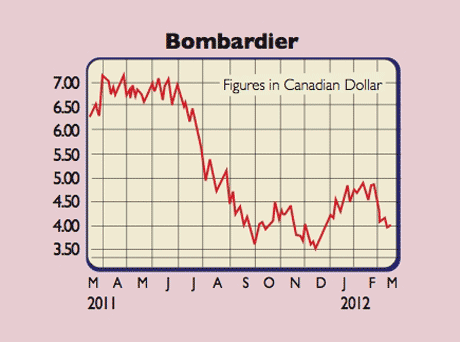Get the latest financial news, insights and expert analysis from our award-winning MoneyWeek team, to help you understand what really matters when it comes to your finances.
You are now subscribed
Your newsletter sign-up was successful
Want to add more newsletters?

Twice daily
MoneyWeek
Get the latest financial news, insights and expert analysis from our award-winning MoneyWeek team, to help you understand what really matters when it comes to your finances.

Four times a week
Look After My Bills
Sign up to our free money-saving newsletter, filled with the latest news and expert advice to help you find the best tips and deals for managing your bills. Start saving today!
If you think you've missed the recent share-price rally, don't worry. There are still plenty of bargains out there. Take Bombardier, the world's number-three in civil aeroplanes (47% of turnover) and number-one maker of trains. These are two solid industries that offer multi-decade growth, evidenced by the firm's enormous $54bn order backlog, equivalent to 2.8 times revenues.
In rail, Bombardier competes against Alstom, Siemens and two large Chinese players in the high-speed, urban and mainline sectors. In aerospace, it specialises in regional business jets, where it has a 32% share. That puts it ahead of rivals such as Hawker Beechcraft. Volumes have been hit by temporary weakness in corporate travel, which is squeezing divisional profit margins.
But with the oil price stuck at $125 per barrel, orders should resume as the desire to replace old aircraft with more efficient models grows. The board estimates that, over the next 20 years, 24,000 planes will be ordered worth $626bn.
MoneyWeek
Subscribe to MoneyWeek today and get your first six magazine issues absolutely FREE

Sign up to Money Morning
Don't miss the latest investment and personal finances news, market analysis, plus money-saving tips with our free twice-daily newsletter
Don't miss the latest investment and personal finances news, market analysis, plus money-saving tips with our free twice-daily newsletter
Bombardier is also set to open a new chapter in its history by unveiling its largest jet, the single-aisle C Series, in late 2013. This will go head-to-head against Airbus and Boeing on short-haul routes. It's being heralded as the greenest, most cost-effective of its class, using 20% less fuel and releasing 20% fewer carbon emissions than competitors. Another huge opportunity is in China, where Boeing estimates 3,500 single-aisle planes alone will be required by 2030. Here Bombardier has inked a strategic partnership with the Commercial Aircraft Corporation of China.
Bombardier (Toronto: BBD.B), rated a BUY by Desjardins Securities

Wall Street is forecasting 2012 turnover and underlying earnings per share (EPS) of $19.2bn and 47 cents respectively, rising to $20.6bn and 56 cents in 2013. That puts the stock on average price/earnings (p/e) ratios of 8.7 and 7.3 for this year and next, while also paying a 2.4% dividend yield. That's far too cheap for an organisation stuffed full of clever technology and leading positions in secular growth markets.
I rate the stock on seven-times 2013 earnings before interest, tax, depreciation and amortisation (EBITDA). After adjusting for the $2bn in net debt and a $3.2bn pension deficit, that produces an intrinsic worth of C$5.50 per share.
Investing just before a major product launch isn't without risk, so be prepared for volatility. There are also the usual headwinds of customer defaults, safety/terrorist scares, a strong Canadian dollar and possible labour issues to consider. And after a series of well-publicised train accidents in China, there is concern that the world's biggest market could take a forced breather.
Yet Bombardier has a proven track record and is launching the C-Series at a time when Boeing and Airbus are unable to respond with a similar change in technology. With fuel representing around a third of airline costs, a more efficient model should prove enticing to carriers.
There is an outside chance that China may extend its current ban on buying long-haul planes from Airbus (in retaliation for Europe's carbon levy). If it does, Bombardier could be in the right place at the right time.
Desjardins Securities has a $7 price target, with first-quarter results due on 10 May.
Paul Hill also writes a weekly share-tipping newsletter, Precision Guided Investments. See www.moneyweek.com/PGI , or phone 020-7633 3634 for more.
Get the latest financial news, insights and expert analysis from our award-winning MoneyWeek team, to help you understand what really matters when it comes to your finances.
Paul gained a degree in electrical engineering and went on to qualify as a chartered management accountant. He has extensive corporate finance and investment experience and is a member of the Securities Institute.
Over the past 16 years Paul has held top-level financial management and M&A roles for blue-chip companies such as O2, GKN and Unilever. He is now director of his own capital investment and consultancy firm, PMH Capital Limited.
Paul is an expert at analysing companies in new, fast-growing markets, and is an extremely shrewd stock-picker.
-
 Should you buy an active ETF?
Should you buy an active ETF?ETFs are often mischaracterised as passive products, but they can be a convenient way to add active management to your portfolio
-
 Power up your pension before 5 April – easy ways to save before the tax year end
Power up your pension before 5 April – easy ways to save before the tax year endWith the end of the tax year looming, pension savers currently have a window to review and maximise what’s going into their retirement funds – we look at how